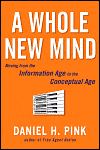Originally
published on Monday, May 9, 2005 in The Miami Herald
The mind is a terrible thing to waste.
Brain
power and economics come together in an in-depth look at where we
could be headed in the wake of the information age.
BY RICHARD PACHTER
rpachterATwordsonwords.com
A
Whole New Mind: Moving from the Information Age to the Conceptual
Age. Daniel H. Pink. Riverhead Books. 272 pages

The whole is greater than the sum of its parts, especially when
the mind is concerned.
Daniel Pink, a former speechwriter and prolific writer, identifies
Asia, abundance and automation as the key forces driving societal
changes. Asia, for its cheap workforce and its demands as a growing
market; abundance, since we are living in an age of unprecedented
plenty; and automation, because most every repetitive commercial
task will soon be performed by machines, if it isn't already.
How each of these forces affects us, individually and as a society,
is what this book is about — at first.
Pink writes: "We are moving from an economy and a society built
on the logical, linear, computer-like capabilities of the Information
Age to an economy and a society built on the inventive, empathic,
big picture capabilities of what's rising in its place, the Conceptual
Age.''
100% BRAIN
His notion is that the right side of the brain — the artistic half,
if you will — can and should be better integrated with the left
half — the more logical and rational portion. By doing so, we will
be able to deal with the changes in our economy once Asia's dominance
really kicks in and whatever economic advantages we possess become
far less potent, if not nonexistent.
But Pink is not a grim prophet of doom. He uses the coming changes
as a springboard for exploring the nature of personal fulfillment,
success and humanity. It's not a touchy-feely self-help manual that
he has constructed. But many of his ideas and approaches are wise,
compassionate and supportive of a variety of personal and professional
endeavors.
It's a pleasant and surprisingly entertaining little trip as he
explores the workings of the brain, celebrates the proliferation
and democratization of Target's designer products and learns to
draw and play games, all as a means of illustrating ways we can
think and live in a better, more meaningful and productive manner.
I reviewed Pink's previous effort, Free
Agent Nation in July 2001, and though I found it to be well-written
and provocative, I was completely unprepared for the breadth and
depth of this new book. It's not that I thought that Pink was incapable
of such an audacious and powerful work; he seems to be one of those
people who excel at many things.
What surprised me about this book is how Pink realized that to empower
individuals, it's necessary to really understand and act upon the
powerful socioeconomic forces that shape the world economy.
OUR STRENGTHS
Unlike many of the recent xenophobic screeds that rail against the
evils of outsourcing, Pink has figured out several paths that individuals
and society can pursue that play to our strengths. The transition
will not necessarily be an easy one, but the full engagement of
both types of thinking — left- and right-directed — is wholly
consistent with many of the qualities that embody traditional American
ingenuity and empathy.
So if Pink is correct, we're almost there. All it may take is for
individuals and institutions to recognize this reality by using
the tools we already possess. And that may well require A Whole
New Mind.
Like business books? Join the club.
|


